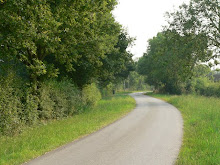This referendum needs thought. Here's mine.
The argument I want to advance is barely political, though
it finds itself in a political context.
All human conflict has at its heart a notion of “us” and “them”.
Without an idea of “us” and of “them”, there would be no
conflicts.
We are at our best as humans when we seek to build
community, understanding and a shared sense of identity. The more we understand
our commonality, the more humanity advances, and the more humane the advance.
There are those who worry about the EU’s enlargement as
swallowing, diminishing “us”. Yet the more we advance together in wider definition
of what that “us” is, the more humanely we are likely to go and grow. The
bigger the scope of “us” we draw, the more compassion.
In contrast, drawing smaller circles of the set called “us”
reduces our empathy and compassion, and, at worst, leads us to inhumane
dismissal of “them”.
The EU isn’t perfect. Nor, sadly, is it an “us” without a “them”.
It is puzzling there is still so much “us” and “them”. It is puzzling that we have at present so few
institutions which are genuinely universal. The more of these we had, the more
we lived as one world, sharing this precious planet of “ours”, the more we
would recognise that there is ultimately only one “us”, the whole of humanity.
The EU isn’t this. But maybe it is an important start. Its
urges for peaceful community are the same urges which may one day take us to
the proper conclusion of that journey. It encourages wide and widening community,
and the peaceful solution of differences within it. If its expansion widens “us”,
so much the better. If that habit eventually leads “us” to the sane conclusion
there is no “them”, how wonderful that would be, and how many of the world’s
most fundamental problems would be on their way to being solved? Perhaps it
will not, but the habit and practice of finding commonality brings that hope
closer to realization than not.
I hope ultimately for a peaceful world, where “we” can share
“our” planet as one. Perhaps I won’t see it in my lifetime. Hopelessly
idealistic, you may say. But if nobody ever hopes for it, there is no hope of
it ever being achieved. So I don’t mind giving my hope to it, even if I’m
alone. Perhaps it will help. That hope is tempered by the sure knowledge that
there are many in the world today who do not yet want that. But there are also
plenty who do.
It is with that hope that I shall vote in the referendum,
placing my vote for the habits of community, for the expansion of “us” and for
participation in an institution which, however flawed, moves us further on that
path of understanding and cooperation
with “our” fellow humans - wider, ever wider.
















